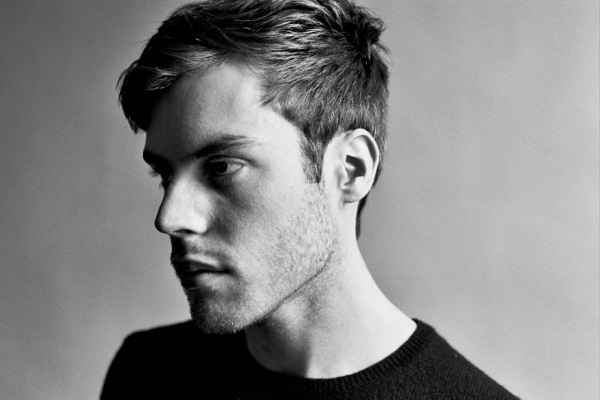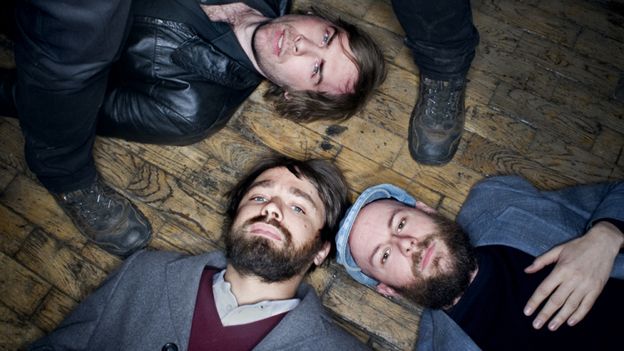Videos by American Songwriter
(PHOTO: Shawn Brackbill)
Jack Tatum, frontman for the group Wild Nothing, is a songwriter with a strong pop sensibility and a good ear for hooks. We had the opportunity to talk with Jack about his new album Nocturne before a recent show in Nashville.
How has the tour gone so far?
The tour has been going really well. We have been on the road a month, but we did a tour earlier this summer with Beach House and that was fun. This is the first big tour we have done since the new album came out, which was at the end of August. All the shows have been good. We have hit a few places we have not been before and places we have that we are happy to be back in.
Any highlights from this tour yet? Has anything crazy happened?
A lot of people have been asking that. The only thing crazy that has happened was when our keyboardist broke his arm skateboarding when we were in Portland. It is definitely something you shouldn’t do when on tour; it is not worth it to potentially break you arm, which he did. He has still been able to play, but he was in a sling for about two weeks or so after it happened. Now, he is just going without it.
There’s a lot more instrumentation on Nocturne than on the previous albums. How was the writing process different with this album than the others?
For me, the first album was a whole lot looser in the creative department because I was going to school when I was making it. It really was kind of a hobby turned project, which turned into an album. I was recording a lot of it in pieces, just whenever I got in the mood or whenever I had free time. I was still taking classes at the time. So Gemini kind of came together pretty slowly. I worked song by song, whenever I would finish something I would move on to the next one.
After becoming more established, being on the road a lot and a having bigger scope of what I am doing as a songwriter and being in a band, I approached Nocturne differently. I was conscious of writing songs for an album and playing with a live band. I did a lot of writing at home by myself, like my first album. So I did some of the same things for the second album, but I thought a little bit more about it like a demo process. Eventually I ended up with a bunch of half finished songs or songs that I knew where they were going, but hadn’t quite figured them all out yet. I took those pieces of songs into the studio and that’s where they all came together.
Do you tend to write lyrics first then melody, or melody first, then lyrics?
I have always written vocal melodies before lyrics, always. That was especially true of Nocturne. The way I write songs is I’ll start a song on one instrument and then from there I will flesh out the entire structure of a song before I am even thinking about vocals. I will have this skeleton of a song and usually whenever I am working on a song I will have a chord structure that I like, there will always be an immediate melody I will hear over it and that normally becomes the vocal melody. From there I feel like I have to fit the lyrics into that melody. It can be somewhat difficult at times, in a way the lyrics take a backseat, which is fine with me at the time being because I am much more interested in the way the vocals can lend themselves melodically to a song. The vocals work almost as another instrument.
You wrote Gemini in college and after it got some buzz you went on tour for a while. Did you write Nocturne with touring in mind? How did you and your band connect?
My band didn’t come into the studio with me when recording Nocturne, but I have been with a couple of the guys in the band pretty much since the beginning. On this tour we have a new drummer and a keyboardist, which we didn’t have before in the live setting.
I think the amount of time we spent touring after the first album came out was kind of happening at the moment. None of it really felt planned, it all seemed to be happening so quickly. I was learning things very rapidly as a result, the way that touring works and playing shows work. I had never really been a performer before, so I felt thrust into this position. It was really good because I was then able to take that into the writing process for Nocturne. It really was something I was thinking about. The first album was so intensely layered that it proved difficult to reproduce some of the songs live. That was something I thought about a lot. I wanted to strip some things away that I was doing in the first album to simplify it and make it easier to translate live.
What is it like knowing that you have created a wide indie-fan base? Does that put pressure on you when writing?
Yeah, it does. I think anyone who finds themselves in some sort of public arena fells pressure. For us it is much more of a niche sort of thing, yet at the same time we still have fans and people, at least I feel we have people that are watching and waiting to see what we will do next. It can be a good and a bad thing. For me I feel like there is a lot of positive and negatives for that, like there is probably some people who didn’t want me to do well. I’m also kind of a paranoid person as it is. So, yeah, you kind of have to be aware of your audience or at least what you hope your fans will get out of it. That was pretty big when I was working on Nocturne.
What is your favorite song on the new album?
I think initially my favorite song on the album was the title track. That was before it was even the title track. That was the song I liked the most before the album was finished or even had a name. It felt like a centerpiece in a way for me, capturing an overall feeling. When I was first writing songs for the album I liked that song a lot and wanted to build the album around the sound of it. I also like the closing track a lot, “Rheya,” which is a slower one for me. It has become my favorite track on the album; it has a really nice subtle build to it.
You did some songwriting in Savannah, Georgia. Did that locale influence the writing?
I only lived in Savannah for a year during a transitional period after school. I wrote a lot of the album while I was there. I do not think there was anything specific about Savannah that I drew direct inspiration from. There was something strange and whimsical about the place, slightly sinister. People say it is one of the most haunted places in America, I don’t know, you can kind of feel it. I felt very connected to the nighttime and in Savannah especially.
If you could co-write with any artist, dead or alive, who would it be and why?
I don’t really know. I was talking to somebody about this recently. We were talking about the Beatles and the classic songwriting dynamic of Paul McCartney and John Lennon. I always felt like John kept things forward moving and a little bit weirder. Paul had the more pop sensibility and reined things in. When you look at their solo discography it reflects that. I have always written by myself; I kind of wish that I had someone else to push me into stranger directions. I feel like a have a classic, pop sensibility. I’m very much a slave to structure and hooks. So it would have to be someone a bit stranger than I. I would love to work with Kate Bush – that would be crazy.
So, what are you listening to right now?
I have been listening to Can and Public Image Ltd a lot. Also, a newer band called Merchandise who we are playing a show with in New York.
Do you ever read or keep up with reviews written about your albums?
I do. I used to a lot more. Right around the time Nocturne came out I was looking at a lot. It is just a weird thing to do and I don’t think it is entirely healthy. I have stopped doing it on this tour and I am much happier because of it. I would say like the first week of tour, around the time the album came out I couldn’t help but be curious. You can become obsessive about it, but at one point I was like I have to stop doing this. It has been much better since I haven’t been worrying about it, especially being on tour and just focusing on playing shows. Having the personal connection with people at any given show, that’s what matters in the long run anyway. I get more from the fans and people that come up to us after shows.









Leave a Reply
Only members can comment. Become a member. Already a member? Log in.